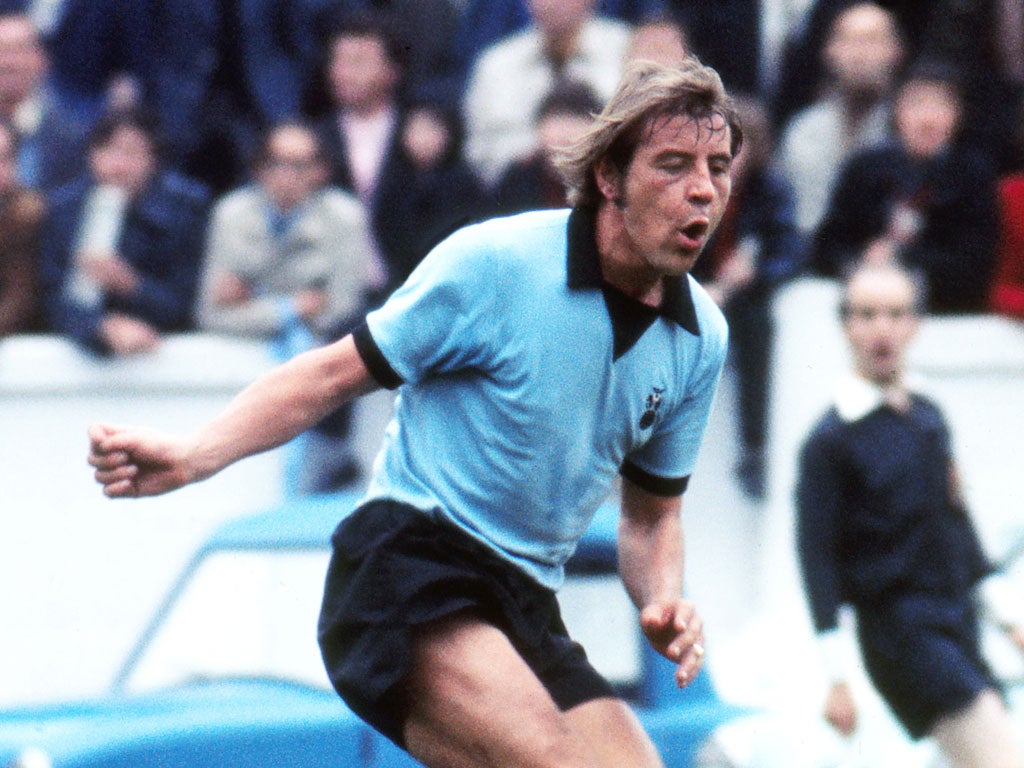
Your support helps us to tell the story
From reproductive rights to climate change to Big Tech, The Independent is on the ground when the story is developing. Whether it's investigating the financials of Elon Musk's pro-Trump PAC or producing our latest documentary, 'The A Word', which shines a light on the American women fighting for reproductive rights, we know how important it is to parse out the facts from the messaging.
At such a critical moment in US history, we need reporters on the ground. Your donation allows us to keep sending journalists to speak to both sides of the story.
The Independent is trusted by Americans across the entire political spectrum. And unlike many other quality news outlets, we choose not to lock Americans out of our reporting and analysis with paywalls. We believe quality journalism should be available to everyone, paid for by those who can afford it.
Your support makes all the difference.Ernie Machin was the exuberant, fiercely determined, subtly talented midfield general at the creative hub of Coventry City's Sky Blue revolution, which carried the club from the third tier of the English game to the First Division in the 1960s under the leadership of their groundbreaking manager Jimmy Hill. Machin, who later shone brightly enough for Plymouth Argyle to be voted into the Pilgrims' team of the 20th century, and then captained Brighton, also found time to make legal history as the first English footballer to successfully challenge an FA fine and suspension in the High Court.
One of Hill's first recruits as Coventry boss, Machin was signed as a 17-year-old in March 1962 from Nelson, a non-League club in his native Lancashire, for an initial £50 – the fee rising by another £200 when he graduated to the first team. When taxed by critics initially unimpressed by the newcomer's lack of pace, Hill declared light-heartedly that he had liked the look in his eyes, a comment which came back to haunt him subsequently when Machin went through an indifferent spell and detractors dismissed him as "the manager's blue-eyed boy".
In fact, the canny Hill had noted that although Machin's movement was sluggish in those early days, he rarely misplaced a pass, he was grittily resolute and he possessed an enviably sharp football brain which was to serve the Highfield Road cause productively throughout a decade of stirring achievement. Hill and the club's chairman, Derrick Robins, were in the process of transforming a hitherto humdrum Third Division club – introducing sky-blue kit with a nickname to match, launching its own radio station and special trains for supporters, and constantly capturing headlines with ceaseless razzmatazz.
Soon Machin emerged as a key constituent of the new Coventry. After making his debut in April 1963, he started the following term in vibrant form, combining beautifully with centre-forward George Hudson, and was being considered for international under-23 honours by the England manager, Alf Ramsey, when his season was sabotaged by injury in the autumn.
By then, the Lancastrian had made enough appearances to qualify for a medal when Coventry were crowned divisional champions in the spring; but knee trouble plagued him throughout the next campaign, in which City consolidated their place in the second tier.
Machin roared back in 1965-66 and was even more influential as the Sky Blues lifted the Second Division title in 1966/67, contributing decisive goals in a series of tight contests and a memorable opener in the crucial Midlands derby victory over promotion rivals Wolves at Highfield Road in April.
Now the playmaker was approaching his prime, ready for extra responsibility, and it arrived early in City's first top-flight season when George Curtis, the inspirational centre-half and captain, suffered a broken leg. Machin took over the captaincy and proved a dominant figure over the next two years as Coventry, now managed by Noel Cantwell, fought successive relegation battles, narrowly escaping the drop on both occasions.
But then, just as the team was growing accustomed to life among the elite – they soared to a sixth-place finish in 1969-70 – Machin was out for months following a car accident. Thereafter, despite knee problems, he continued to serve the City cause as the side's consistency dipped in the early 1970s.
It was in 1972 that Machin did much to change the balance of power between the FA and professional footballers when he won a test case following his sending-off for allegedly kicking an opponent. He was cleared on television evidence, but the disciplinary committee spotted another offence on the film and banned him for that. However, there had been no formal charge, no chance for Machin to assemble a defence, and when he took his case to the High Court, it was ruled that the FA had not delivered natural justice, a landmark which helped to pave the way to a disciplinary points system.
In December of that year, after nearly 300 games and 39 goals for the Sky Blues, the 28-year-old stepped down two divisions, a £35,000 fee taking him to Plymouth, where he excelled anew. Indeed, in his only full campaign for Argyle, 1973-74, he was voted player of the season and was ever-present in the Pilgrims' progress to the semi-finals of the League Cup, where they lost to Manchester City.
As a result, Machin received his "team of the century" accolade and many fans were dismayed when he was sold to Brighton, also of the Third Division, for £30,000 in August 1974. At the Goldstone he flourished as captain of the Seagulls until he was dropped in favour of the younger Brian Horton as Brighton strove unavailingly for promotion in 1976.
After that, Machin retired, briefly coaching youngsters at Coventry before working in the transport business.
Ivan Ponting
Ernest Machin, footballer: born Little Hulton, Lancashire 26 April 1944; played for Coventry City 1962-72, Plymouth Argyle 1972-74, Brighton and Hove Albion 1974-76; died Coventry 22 July 2012.
Join our commenting forum
Join thought-provoking conversations, follow other Independent readers and see their replies
Comments